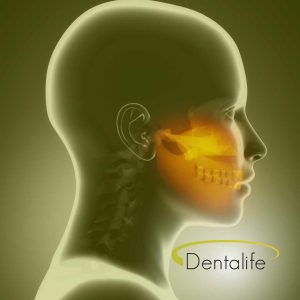Dr. Curtis Westersund, TMJ Practitioner, Calgary Downtown:
“The human body is a fascinating interplay of systems, working harmoniously to support our daily lives. However, even the slightest imbalance in your body can lead to discomfort, even pain. One such instance is Temporomandibular Joint Disorder, commonly referred to as TMJ.
This crucial hinge joint connects the jaw to the temporal bones of the skull, allowing us to talk, chew, and yawn. When this joint is disrupted or misaligned, it often leads to a condition known as TMJ disorder. This disorder manifests in a myriad of ways, from jaw discomfort to debilitating migraines, making it an imperative issue to address for many individuals.”
The link between TMJ and migraines
But how does a jaw disorder result in migraines? The answer lies in the complex network of nerves that run through the temporomandibular joint. The trigeminal nerve, one of the primary facial nerves, has a significant branch running through the TMJ and happens to be a crucial nerve involved in headache disorders. When TMJ becomes misaligned or stressed, it irritates this nerve, which can lead to persistent headaches and migraines. Besides nerve strain, TMJ disorder can also cause muscle tension around the neck and head, another common cause of migraines.
Is TMJ Treatment effective for migraines?
Recognizing the strong correlation between TMJ and migraines, the logical question that follows is – can TMJ treatment help alleviate migraines? The answer is a resounding yes. TMJ treatments focus on rectifying the root cause – the misalignment or stress of the temporomandibular joint. By doing so, the treatment seeks to relieve the strain on the trigeminal nerve and reduce the associated muscle tension.
A range of treatments is available, depending on the severity of the disorder. These include pain relievers and anti-inflammatories, oral splints or mouth guards, physical therapy, and in severe cases, surgical procedures. TMJ exercises, for instance, can help strengthen the jaw muscles, improve jaw movement, and promote healing. In addition to medical interventions, lifestyle modifications, such as reducing stress and avoiding excessive jaw movements, can also support TMJ treatment and thus, alleviate migraines.
TMJ Practitioner Calgary Dr. Curtis Westersund’s unique approach to TMJ treatment
Now, imagine if you could find someone who not only understands the intricacies of TMJ disorder but also possesses the knowledge and skill to address it effectively. Introducing Dr. Curtis Westersund, a dedicated general dentist in downtown Calgary with 30+ years TMJ treatment experience. His deep understanding of dental science and neuromuscular functionality, activated a patient-centric approach and unique dental solutions for TMJ migraines. Dr. Westersund has helped many individuals regain their health and wellbeing.
Dr. Westersund believes in the value of identifying and treating the root cause rather than just managing the symptoms. He employs a personalized BIO-MECHANICAL approach that factors in the specific needs and conditions of each patient. Through the application of comprehensive diagnostic techniques, he pinpoints the precise issues and formulates an effective treatment plan. His innovative treatments have proven successful in bringing the jaw into alignment, reducing nerve irritation, easing muscle tension, and consequently mitigating migraines.
Taking action towards pain relief
It is a common adage that ‘time heals all wounds,’ but when it comes to pain, especially that of TMJ disorder-related migraines, waiting often doesn’t help. Pain is not just a physical sensation but an urgent call for action from our bodies. It’s a sign that something is off, and needs correction. Ignoring this call, hoping that it will fade away with time, usually leads to the problem persisting or even worsening.
Inaction may be born from fear or uncertainty, but taking the first step towards seeking help can set the healing process in motion. By acknowledging your pain and seeking professional help, you embark on a journey towards relief and recovery.
In the case of TMJ disorder and its associated migraines, this means seeking the advice and treatment from a trusted healthcare provider, like Calgary TMJ Practitioner Dr. Curtis Westersund. His unique approach to TMJ treatment addresses the underlying issue, not just the resulting migraines, which may provide a more lasting solution compared to temporary pain relief.
Embark on your journey towards a solution for TMJ migraines
Living with chronic migraines can be a struggle, affecting your quality of life. But remember, the power to change this lies within you – it starts with taking that first step. So, if you’re living with persistent migraines that might be linked to TMJ disorder, please don’t wait. Take action today, reach out to a knowledgeable healthcare provider like Downtown Calgary TMJ practitioner Dr. Westersund at Dentalife, and embark on your journey towards a pain-free life.




